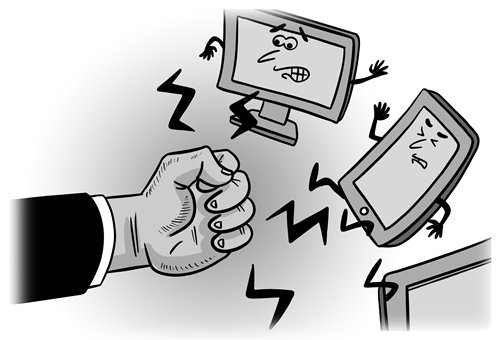HOME >> BUSINESS
US antitrust review may redefine internet pattern
By Fang Xingdong Source:Global Times Published: 2019/8/20 18:23:41

Illustration: Luo Xuan/GT
The US Department of Justice recently announced that it has officially launched a wide-ranging antitrust review into several internet giants. The investigation will look into how those market-leading online platforms achieved their market power and whether or not they were "engaging in practices that have reduced competition, stifled innovation or otherwise harmed consumers." The review will also consider the "widespread concerns" that consumers, businesses and entrepreneurs have expressed about internet search engines, social media, and some retail services online. Seemingly, this will be the most influential event in the last 30 years of the internet business.
The last large-scale antitrust movement was the anti-monopoly lawsuit launched by US authorities against Microsoft. The focus of the antitrust review this time around will likely include Google, Amazon and Facebook. It is no exaggeration, therefore, to say that the US government will likely redefine industrial patterns for the next 10 to 20 years with this move.
Over the past five years, it was not uncommon to see anti-monopoly cases in the global internet industry. For instance, European regulators successively slapped Apple, Facebook, Google, Amazon, and other tech companies with big fines.
But the US' move this time may mark the start of stricter antitrust punishments in the global internet industry. In addition to penalties for abuse, as well as restrictions on giants' acquisitions and mergers, the US government may implement its most stringent measure - to break up the tech giants. Moreover, since this antitrust review is a wide-ranging one, its impact is likely to be seen beyond the industry.
There have been three rounds of anti-monopoly probes in the history of the global high-tech sector, with each targeting a tech giant.
The first was the anti-monopoly investigation into AT&T in the middle of the 20th century, which eventually forced AT&T to grant American companies royalty-free licenses on any patent from Bell Labs (transistors, lasers, cellular systems, satellites, solar cells, and other patents). Then, these technologies directly contributed to the birth and rise of the Silicon Valley, which led to the emergence of many large companies such as Fairchild Semiconductor, Motorola, Texas Instruments, Intel and AMD.
The second anti-monopoly wave in the 1970s focused on IBM, which was the undisputed leader in the computer field. IBM finally agreed to abandon the integration of its hardware and software businesses, allowing other companies to develop software for their computers. Without this anti-monopoly review, the rise of companies like Microsoft would never have occurred.
The third wave of antitrust reviews was mainly aimed at the software giant Microsoft in the late 1990s. Although a drawn-out appeal finally overturned the court's original decision to split Microsoft, companies like Google, Amazon and Facebook would not be able to stand out today without the antitrust lawsuit of the century.
This time around, the antitrust review is not just targeting the monopoly issues of Google, Amazon and Facebook in the search engine, e-commerce and social media fields. It also includes Apple's closed mobile operating system and application store, Qualcomm's mobile phone chip patents, and Microsoft's still-unbreakable monopoly on operation systems. Most of these tech giants have seen their market capitalizations reach trillions of dollars, which has had an unprecedented impact on both business development and the capital market.
Unlike the fierce debates between supporters and opponents in the past, public opinion has been relatively consistent toward this round of antitrust reviews. With the exception of the giants themselves, industry insiders, academic circles, the government and the public have reached an overwhelming consensus to call for strong measures from the US government.
At present, market concentration in China's internet sector is not low compared with that of the US, and the abuse of monopoly is also quite common, involving quite a number of fields. In addition to the similar monopoly situation as the US, some behemoths have even taken advantage of their platforms to quickly expand into the financial, media, education, and security fields. Yet, thus far, antitrust efforts in the internet sector remain lacking in China. One of the major reasons for this lies in industry policymakers' inherent misunderstanding, believing that anti-monopoly moves are in opposition to growth and expansion. In fact, history proves that by addressing low-efficiency competition, anti-monopoly action is actually a fundamental tool to increase development, strength and innovation.
Over the past half century, each of the anti-monopoly actions in the US high-tech industry succeeded in stimulating the vitality of competition and expanding a new industrial structure.
China's internet and high-tech sectors have not yet undergone a real wave of such an action. The Chinese high-tech sector is strongly urged to leave its erroneous zone and go through the test of anti-monopoly action.
The author is director of the Center of Internet and Society at Communication University of Zhejiang. bizopinion@globaltimes.com.cn
Posted in: INSIDER'S EYE